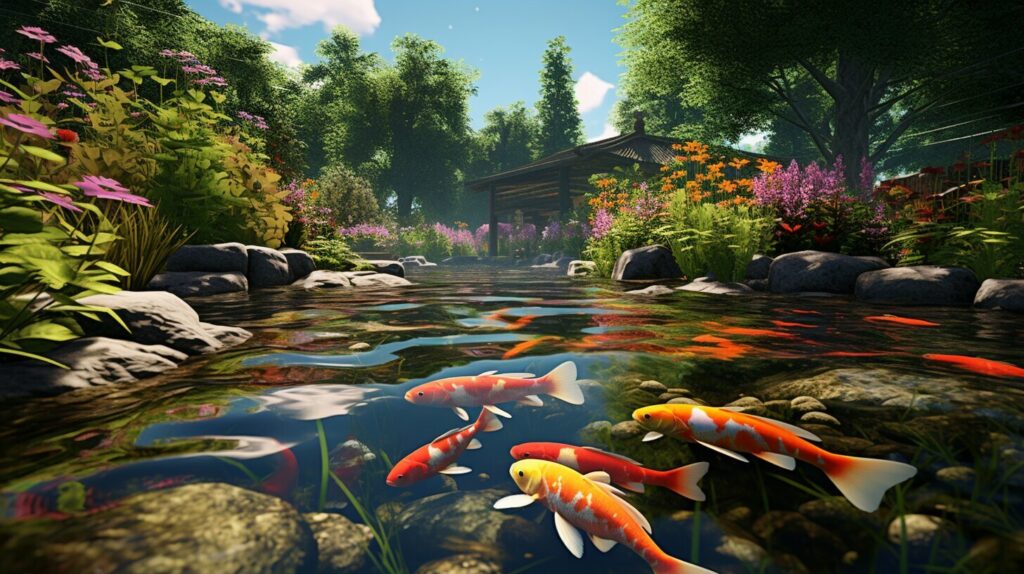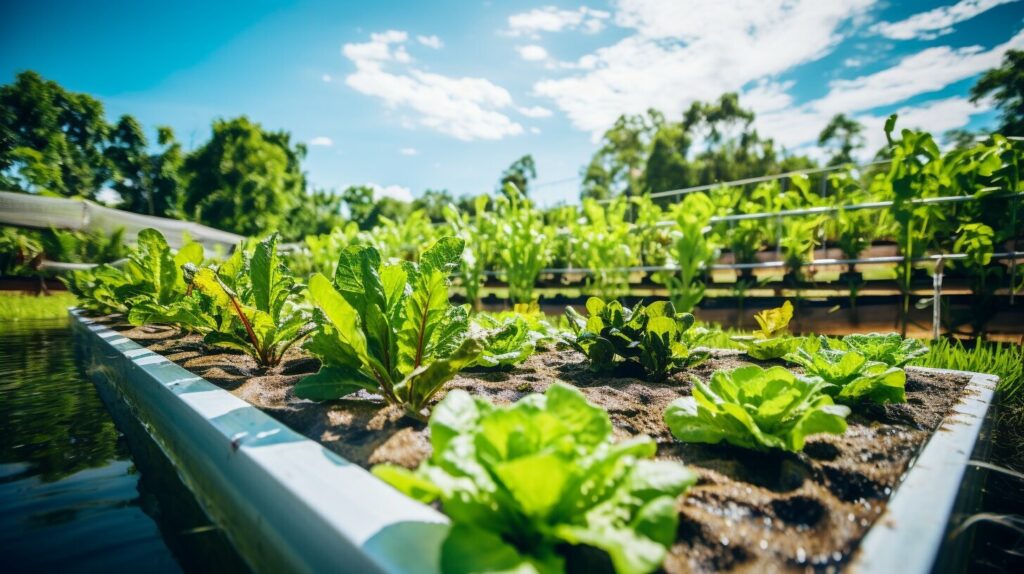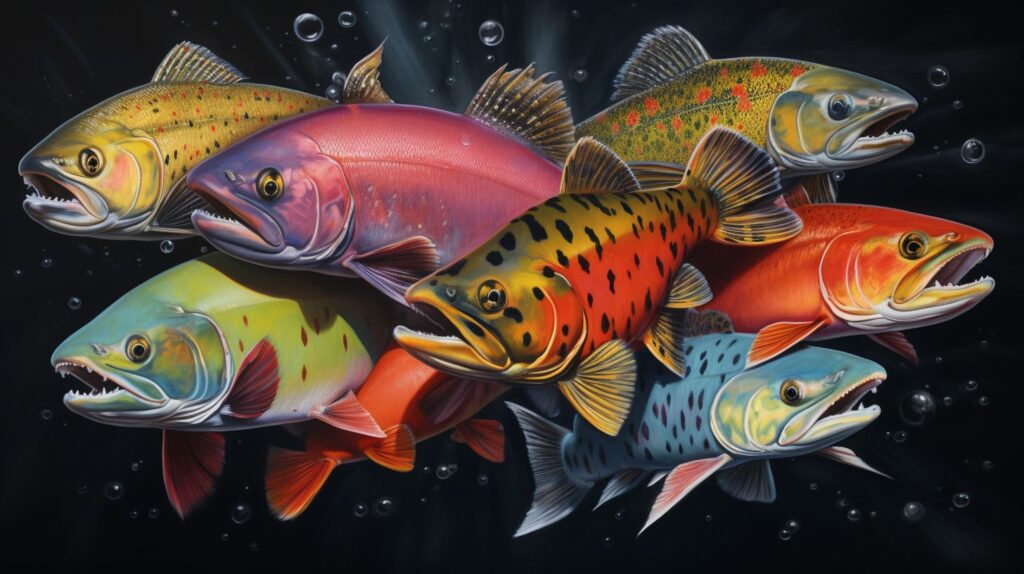This post may contain affiliate links and we may earn a small commission when you click on the links at no additional cost to you. As an Amazon Affiliate, we earn from qualifying purchases. You can read our full disclaimer here.
If you’re new to aquaponics, you may wonder about the most common health issues affecting your fish. As an aquaponics farmer, you must ensure optimal fish health to maintain a healthy system. Understanding common health issues in aquaponics fish is crucial for identifying and addressing problems promptly.
Common health issues in aquaponics fish can range from minor ailments to life-threatening diseases. These issues can arise from many factors, such as inadequate water quality, poor nutrition, or environmental stress. Monitoring your fish’s health is essential to ensure they are thriving in a healthy environment.
In this article, we will discuss the most common health issues that can affect aquaponics fish and provide insights on how to prevent them. Ensuring your aquaponics fish remain healthy is essential for maintaining a healthy system. Take preventive measures to promote their well-being.
So, let’s dive in and explore the common health issues in aquaponics fish, why they matter, and ways to keep your fish healthy and thriving in your aquaponics system.
Key Takeaways
- Understanding common health issues in aquaponics fish is crucial for maintaining a healthy system.
- Common health issues in aquaponics fish can range from minor ailments to life-threatening diseases caused by factors like water quality, nutrition, and stress.
- Prioritizing fish health is essential for the overall success of your aquaponics system.
- Recognizing early signs of fish health issues, such as abnormal behavior or reduced appetite, is vital for prompt treatment.
- Addressing fish health issues involves isolating affected fish, identifying the cause, and taking appropriate actions like adjusting water quality or administering medication.
- Maintaining optimal water quality through regular testing and monitoring parameters like pH, ammonia, nitrite, and nitrate is crucial for fish health.
- Regulating environmental conditions, including temperature, light, and oxygen levels, is important for the well-being of your fish.
- Selecting healthy fish and quarantining new additions can prevent the introduction and spread of diseases in your aquaponics system.
- Proper nutrition and feeding practices tailored to your fish species are essential for their health.
- Implementing preventive measures such as choosing healthy fish, maintaining a clean environment, providing a balanced diet, quarantining new fish, and avoiding overstocking can protect your fish from diseases and ensure the success of your aquaponics system.
Importance of Fish Health in Aquaponics

Healthy fish are essential for the success of your system. Your fish play a significant role in the overall balance of the system, and an unhealthy fish can easily disrupt the entire ecosystem. Therefore, it’s crucial to prioritize fish health in aquaponics.
Preventing fish diseases is key to maintaining their health. You can reduce the likelihood of your fish contracting diseases and other health issues by implementing proper fish care practices. Preventive measures that you can take include monitoring water quality, ensuring proper nutrition, and practicing good hygiene during fish handling.
Regular observation of your fish and the entire aquaponics system is also essential. By recognizing the early signs of fish health issues, you can promptly treat the problem before it becomes more severe. Common symptoms of fish health problems include abnormal behavior, reduced appetite, and skin discoloration.
Remember that each fish species has unique nutritional and environmental requirements, and you should tailor your feeding and maintenance practices accordingly. In addition, you must avoid overstocking your system and introduce new fish carefully through a quarantine process to prevent the spread of diseases.
By prioritizing fish health in your aquaponics system, you are investing in the well-being of your fish and the success of your system. Regular observation, preventive measures, and prompt treatment of fish health issues are essential for ensuring your aquaponics fish’s optimal health and longevity.
Common Fish Diseases in Aquaponics
Like any animal in a confined setting, fish in aquaponics systems are susceptible to diseases and health issues. As you understand the common fish diseases in aquaponics, you can take the necessary steps to prevent and treat them.
| Disease | Cause | Symptoms | Treatment |
|---|---|---|---|
| Ichthyophthirius multifiliis (Ich) | Parasitic infection | White spots on fins, body, and gills; fish rubbing against surfaces | Medications such as malachite green and formalin |
| Columnaris | Bacterial infection | White or grayish patches on the body; frayed and discolored fins | Antibiotics such as oxytetracycline and sulfadimethoxine |
| Aeromonas | Bacterial infection | Bloody patches on the skin, abdominal swelling, loss of appetite | Antibiotics such as erythromycin and ciprofloxacin |
| Flexibacter | Bacterial infection | Red lesions on the body; discolored and frayed fins | Antibiotics such as erythromycin and furazolidone |
| Costia | Parasitic infection | Excessive mucus production; lethargy; red, inflamed areas on gills and skin | Medications such as potassium permanganate and formalin |
It’s important to note that prevention is key to avoiding fish diseases in aquaponics. Proper care and maintenance of the system can go a long way in preventing the onset of diseases. However, if you notice any of the symptoms mentioned above, it’s essential to take action promptly to prevent the disease from spreading to other fish in the system.
Recognizing Fish Health Issues
Knowing how to recognize signs of fish health issues early on is essential. Fish can’t communicate with us verbally, but they do exhibit physical symptoms and behavior changes that indicate potential health problems
Signs of Fish Health Issues
Stress is the most common cause of health problems in fish. Fish stress can be caused by various factors, including poor water quality, overcrowding, or improper handling during transportation.
- Fish swimming close to the surface or gasping for air
- Abnormal swimming behavior, such as lethargy or erratic movements
- Loss of appetite or refusal to eat
- Discoloration or red streaks on the body
- Cloudy eyes or bulging eyes
- Frayed fins or tail
If you notice any of these signs, you should take action immediately to prevent the health issue from worsening.
Addressing Fish Health Issues
If you suspect a health issue in one of your aquaponics fish, addressing it as soon as possible is important. The first step is to isolate the affected fish into a separate tank to prevent the spread of disease to other fish. Then, carefully observe the fish’s behavior and symptoms to determine the root cause of the problem.
Once you have identified the cause, you can take appropriate action to treat the fish. This may include adjusting water quality parameters, administering medication, or adjusting feeding practices. If the health issue is severe and cannot be treated, you may need to remove the infected fish to prevent the spread of the disease.
Only then can you ensure the well-being of your aquaponics fish and the success of your aquaponics system.
Maintaining Water Quality for Fish Health

You have to maintain optimal water quality as it is crucial to the health of your fish. Poor water quality can lead to stress, disease, and even death in your fish. Therefore, monitoring and regulating water parameters is essential.
Monitoring Water Quality
Regularly testing the water in your fish tank ensures that the environmental conditions suit your fish. Parameters such as pH, ammonia, nitrite, and nitrate levels should be tested regularly.
| Parameter | Ideal Range | Dangerous Levels |
|---|---|---|
| pH | 6.8-7.2 | Below 6 or above 8 |
| Ammonia | 0 ppm | Above 0.25 ppm |
| Nitrite | 0 ppm | Above 0.5 ppm |
| Nitrate | Below 40 ppm | Above 80 ppm |
Regular water changes and adding organic matter can help regulate water quality. Maintaining a healthy bacterial colony in your biofilter can also help control ammonia and nitrite levels.
Regulating Environmental Conditions
Fish are sensitive to environmental conditions such as temperature, light, and oxygen levels. Therefore, regulating these conditions is essential for their well-being.
- Temperature: Aquaponic fish thrive in water temperatures between 68°F-72°F. Ensure the water temperature is within this range and avoid rapid temperature fluctuations.
- Light: Fish need a regular light-dark cycle. Provide 12-16 hours of light per day, followed by 8-12 hours of darkness.
- Oxygen: Aquaponic fish require oxygen-rich water. Installing an air stone or diffuser ensures that your tank’s oxygen levels are adequate.
You can maintain optimal conditions for your fish to thrive in your aquaponic system by following the above guide.
Fish Selection and Quarantine
Choosing healthy fish is crucial for maintaining the overall health of your aquaponics system. When selecting fish, it’s essential to choose disease-free and in good physical condition.
Before adding new fish to your system, it’s crucial to quarantine them. Quarantining the fish in a separate or isolation tank is an important preventive measure to avoid introducing diseases to your main system.
When adding new fish to your system, keeping them in quarantine for at least two weeks is recommended. This will allow you to monitor them for any signs of illness or disease before introducing them to the main system.
It’s important to note that any fish showing signs of illness or disease should be removed immediately to prevent the spread of infection to other fish in the tank.
| Steps to Quarantine New Fish |
|---|
| 1. Choose a separate tank or isolation tank for the new fish |
| 2. Keep the new fish in quarantine for at least two weeks |
| 3. Monitor the new fish for any signs of illness or disease |
| 4. If the new fish shows any signs of illness or disease, remove them immediately |
Nutrition and Feeding Practices for Fish Health

Proper nutrition is crucial for maintaining the health and well-being of your aquaponics fish. The right fish feed can give them the necessary nutrients for growth, immunity, and overall health. To ensure your fish receive optimal nutrition, it’s important to select the right type of fish food and follow recommended feeding practices.
When selecting fish food, consider the species of fish you have and their dietary requirements. Different species have different nutritional needs, so choosing a suitable feed that meets their dietary requirements is essential.
Commercial fish feeds are readily available and are designed to meet most of your fish’s nutritional needs. The feeds come in different forms, including pellets, flakes, and crumbles. Pelleted fish feeds are a popular choice as they are easy to handle and less messy than other types of fish food.
When feeding your fish, aim to provide them with the right amount of food. Overfeeding can cause water quality issues and lead to health problems. As a general rule, feed your fish small amounts of food they can consume within a few minutes, two to three times daily. Avoid overfeeding or wasting food, as this can cause water quality issues and contribute to the growth of harmful bacteria.
It’s also essential to monitor your fish’s feeding behavior. If your fish are not eating or are showing signs of stress, it may indicate a health problem or water quality issue. Ensure that your fish are getting the right amount of food, and check the water quality parameters frequently to prevent any issues from arising.
Preventive Measures for Fish Disease
As a responsible aquaponics fish keeper, it’s important to take preventive measures to protect your fish from diseases. Knowing the causes of fish diseases can help you implement effective prevention strategies. Here are some preventive measures you can take:
- Choose healthy fish: When selecting new fish for your aquaponics system, ensure they’re healthy and disease-free. Inspect them carefully for any signs of illness. Look for clear eyes, healthy skin, and active swimming behavior. Avoid adding stressed, injured, or weak fish, as they’re more vulnerable to diseases.
- Maintain a clean environment: Keep the water in your tank clean and free from pollutants. Use a quality filter to remove waste and debris, and regularly monitor the pH, ammonia, nitrite, and nitrate levels. Avoid overfeeding your fish, as uneaten food can break down and release toxins into the water.
- Provide a balanced diet: Give your fish a well-balanced diet that meets their nutritional needs. Use high-quality fish feed appropriate for your system’s fish species. Don’t feed your fish too much or too often, as this can cause them to become obese and more susceptible to diseases.
- Quarantine new fish: Before introducing new fish into your aquaponics system, isolate them in a separate tank for at least a week. Observe them closely for signs of illness, such as lethargy, loss of appetite, or abnormal behavior. If you notice any symptoms, treat the fish in the isolation tank before adding them to your main tank.
- Avoid overstocking: Don’t overcrowd your tank with too many fish. Overstocking can increase the risk of diseases spreading, as fish will be stressed and more susceptible to infections. Follow the recommended stocking guidelines for your aquaponics system.
If you notice any signs of illness in your fish, take prompt action to treat them or remove them from the tank to prevent the spread of the disease.
Conclusion: Understanding Common Health Issues in Aquaponics Fish
Congratulations! You now have a comprehensive understanding of common health issues that can affect aquaponics fish. Remember, maintaining your fish’s well-being is crucial for your aquaponics system’s success. If you notice any signs of fish health issues, it’s important to take prompt action.
Treat fish diseases as soon as possible to prevent them from spreading to other fish in your system. Remove the infected fish and quarantine them in a separate tank if necessary. In addition, make sure to monitor and regulate water quality regularly. Maintaining optimal environmental conditions is essential for the health of your fish.
Choosing healthy fish and implementing a quarantine process can also help prevent the spread of diseases. And don’t forget about nutrition and feeding practices – proper nutrition is key to maintaining fish health. Implementing these preventive measures and taking action when necessary will ensure that your aquaponics fish thrive in a healthy and supportive environment.



